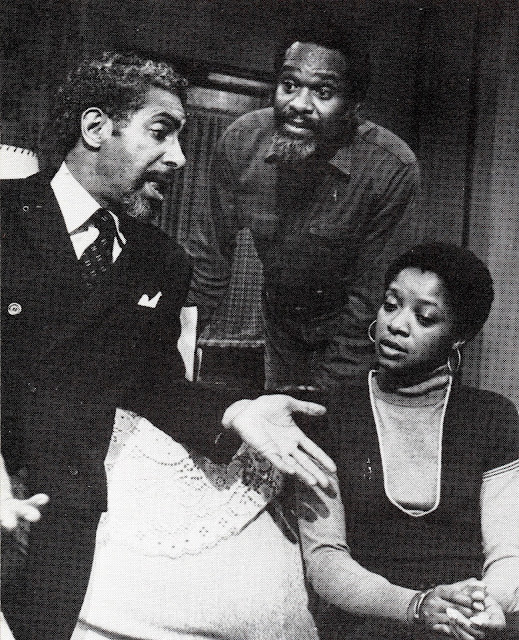 |
| Grenna Whitaker, Frances Foster, Les Roberts, Roxie Roker, Les Roberts. |
 |
| Graham Brown, Douglas Turner Ward, Grenna Whitaker. |
Perhaps the most effective Black drama of the
decade, The River Niger zoomed to
success from its humble beginnings at Off Broadway’s St. Marks Playhouse to the
bright lights of Broadway in a magnificently realized ensemble production
directed by and starring Douglas Turner Ward. “Broadway has gotten itself a
most remarkable black play,” exclaimed Clive Barnes. “Its blackness is beautiful,
but its common humanity is everything.” It ran on Broadway after a year, following
nearly half a year Off Broadway.
 |
| Grenna Whitaker, Les Roberts. |
Although somewhat overwritten, long, and melodramatic, The River Niger surged and swelled with
the powerful delineation of its dignified, humorous, suffering, violent, and
ambitious characters. It received highly complimentary reviews from nearly
every critic, both for the potency and pungency of its writing, and the
intensely moving and believable quality of its performances.
 |
| Douglas Turner Ward, Roxie Roker. |
The play is set in the 133rd Street Harlem apartment of
Johnny Williams (Ward), a 60ish, would-be poet, boozehound, and house painter,
a man who gave up his college studies to help feed his family. It presents an
incident-laden plot about Jeff (Les Roberts), Johnny’s son who is returning
from the Air Force with hopes of becoming a lawyer, but who is soon enmeshed
with an old friend, Mo (Neville Richen), and his pathetic, radical militant
cronies. We meet Johnny’s old mother-in-law (Frances Foster); Johnny’s wife
(Roxie Roker), a devoted matriarch who is being consumed by cancer; and a
cynical, but kindhearted family friend, a doctor of Jamaican background (Graham
Brown).
 |
| Roxie Roker, Les Roberts, Frances Foster. |
The play ends in violence when Johnny is shot by one of Mo’s
gang, an act followed by Mo killing the murder in retaliation. Throughout, Johnny
seeks completion of his grandiose symbolic poem about the Black man’s struggle
and nobility, “The River Niger.” When, at length, it is read, it provides the
play with a powerful emotional climax.
 |
| Dean Irby, Charles Weldon. |
The River Niger
displays the need for the Black man to fight to retain, maintain, and attain
dignity in a vicious world. In commenting on it, the critics pointed to its
depth of feeling, its honest concern with the problems of Black people confronting others within their own midst instead of seeing them purely as imposed by white
society, its diverse and finely depicted characters, and its touching, funny,
and profane dialogue. “The play’s statement,” declared Harold Clurman, “is
humorous, lyric, virile, crude, and oddly inspiring.”
What proved most irksome were the work’s melodramatic
excesses, its overuse of subplots, and a tendency toward the propagandistic and
didactic. Martin Gottfried accused Walker of writing a “message melodrama” on
the level of Clifford Odets, an analogy shared by T.E. Kalem. Gottfried added, “good
plays rarely come from social problems. . . . [I]ts style is obsolete, its
points are obvious and redundant.” Barnes’s representative comments noted that acting
in The River Niger was “as honest and
as eloquently rumbustious as the play itself. Despite this unfiltered emotion,
there is also very smooth and effective ensemble playing”
The play won both an OBIE and a Tony for Best Play, in addition to the Elizabeth Hull—Kate Warriner 1973 Award. Joseph Walker was honored with a Drama Desk Award for Most Promising Playwright, while Douglas Turner Ward received a Tony nomination for Best Actor, Play, and and OBIE for Distinguished Performance. Finally, Roxie Roker received the corresponding recognition for her performance.
Note: a reader informed me that Ward's nomination for the Tony as Best Supporting Actor disturbed the actor, who felt he should have been up for the Best Actor slot. Not much about the controversy is available online but I did find this in the New York Times report on the Tony Awards for 1973-1974. It points to the comments of playwright Joseph Walker on receiving his own award: "in his acceptance speech Mr. Walker mentioned that he supported the protest of Douglas Turner Ward, the play's director and principal actor, who boycotted the ceremonies because he had been nominated as best supporting actor, and not best actor."